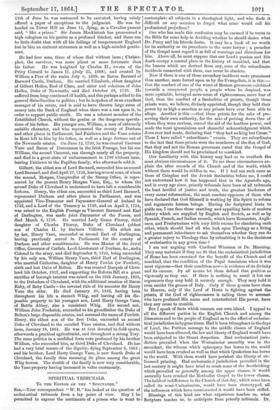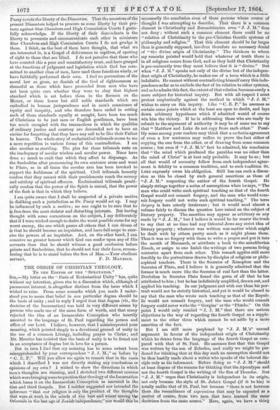SPIRITUAL TRIBUNALS.
To THE EDITOR Or THE " SPECTATOR."
SIR,—Your correspondent " W. B." has looked at the question of ecclesiastical tribunals from a lay point of view. May I be permitted to express the sentiments of a person who is wont to contemplate all subjects in a theological light, and who finds it difficult on any occasion to forget what some would call his professional prejudices?
One who has made this confession may be excused if he turns to the Bible for some help in deciding whether he should desire what Dr. Pusey and his friends desire. It may be a book of no worth for its authority or its precedents to the mere lawyer ; a preacher of the Gospel must regard it as full of warnings and directions for him. Above all, he must suppose that our Lord's passion and His death occupy a central place in the history of mankind, and that the lessons which are derived from any, even of the subordinate incidents connected with them, can never be obsolete.
Now if there is one of these secondary incidents more prominent than another, more forced upon us by the Evangelists, it is this :— that the conduct of one of the worst of Roman governors exhibited towards a conquered people, a people whom he despised, was more equitable, betrayed more sense of righteousness, more fear of God, than the conduct of a Sanhedrim of priests, though those priests were, we believe, divinely appointed, though they held their power by as high a sanction as any priests have ever been able to allege. Another is this :—that these priests for the sake of pre- serving their own authority, for the sake of putting down One of whom they were envious, craved the aid of the heathen power, and made the most ignominious and shameful acknowledgment which Jews ever had made, declaring that " they had no king but Caesar." These I have called " subordinate " events. They are subordinate to the fact that these priests were the murderers of the Son of God, that they and not the Roman governors cared that the Gospel of His kingdom should not be proclaimed to mankind.
Our familiarity with this history may lead us to overlook the most obvious circumstances of it. To me these circumstances ex- plain the after records of the Church and of the world, which without them would be riddles to me. If I had not such cases as those of Caiaphas and the Jewish Sanhedrim before me, I could not understand how it has happened that in the Apostolic age, and in every age since, priestly tribunals have been of all tribunals the least heedful of justice and truth, the greatest hinderers of every moral reformation, the most resolute opposers of those who have declared that God Himself is working by His Spirit to reform and regenerate human beings. Having the Scriptural hints to guide me, I can face those startling and appalling facts of modern history which are supplied by English and Scotch, as well as by Spanish, French, and Italian records, which leave Romanists, Angli- cans, and Presbyterians with very little excuse for slandering each other, which should lead all who look upon Theology as a living and permanent inheritance to ask themselves whether they can do a greater injury to Theology than by submitting it to the decisions of ecclesiastics in any given time ?
I am not arguing with Cardinal Wiseman or Dr. Manning. They may maintain if they see fit that the ecclesiastical jurisdiction of Rome has been exercised for the benefit of the Church and of mankind, that the condition of the Papal dominions when it was most vigorous—that their condition now—is evidence of its divinity and its success. By all means let them defend that position as vigorously as they can. If there is nothing to assail it but our arguments they may hold it securely enough. They may hold it even amidst the groans of Italy. Only if those groans have risen to Heaven, only if the Lord of Hosts is fighting against the priests, if the God of righteousness is calling those to aocosiat who have profaned His name and counterfeited His power, have they any cause to tremble.
But I speak of facts which concern our own island. I appeal to all the different parties in the English Church and among the Dissenters and to the people of England as to the effect of ecclesias- tical jurisdiction inbygone times. Had it been triumphant in thedays of Laud, the Puritan message to the middle classes of England would have been silenced, the law and liberty of England would have been subjected to the Stuart despotism. Had ecclesiastical juris- diction prevailed when the Westminster assembly was in the ascendant, the witness which episcopacy has borne to the world would have been crushed as well as that which Quakerism has borne to the world. With them would have perished the liberty of un- licensed printing. Had ecclesiastical jurisdiction prevailed in the last century it might have tried to crush some of the freethinking which prevailed so generally among the upper classes, it would assuredly have crushed the Methodist Gospel to the lower classes. The habitof indifference in the Church of that day, which some have called its semi-Unitarianism, would have been stereotyped, all the influences which have counteracted it would have been stifled.
Blessings of this kind are what experience teaches us, what Scripture teaches us, to anticipate from priestly tribunals. Dr.
Pusey covets the liberty of the Dissenters. That the ancestors of the present Dissenters helped to procure us some liberty by their pro- tests against Star.Chambers and High Commission Courts I grate- fully acknowledge. If the liberty of their descendants is the liberty to persecute and excommunicate each other in miniature Star Chambers and High Commission Courts I do not grudge it them. I thinkola the best of them, have thought, that what we are interested in, is a Gospel of deliverance to captives, of opening of sight to those that are blind. I do not perceive that those who have counted this a poor and unsatisfactory trust, and have grasped at the functions of judgment and legislation which God has com- mitted to another class of men, have used those functions wisely, or have faithfully performed their own. I find no perversions of the moral law so gross, no denials of the God of righteousness so shameful as those which have proceeded from men who have not been quite sure whether they were to obey that highest standard which is set before them in the Sermon on the Mount, or those lower but still noble standards which are embodied in human jurisprudence and in men's conscience of equity and inequity, and who therefore have ended in setting each of these standards equally at naught, have been too much of Christians to be just men .or English gentlemen, have been too much occupied with the transactions in which the qualities of ordinary justice and courtesy are demanded not to have an excuse for forgetting that they have any call to be like their Father in heaven. The whole story of ecclesiastical tribunals seems to me Is mere repetition in various forms of this contradiction. I see also another as startling. The plea for these tribunals rests on the inadequacy of secular wisdom and secular power. None have done s ) much to exalt that which they affect to ditiparage. As the Sanhedrim after pronouncinglis own sentence arose and went to Pilate, so in all times the secular arm has been invoked to support the feebleness of the spiritual. Civil tribunals honestly confess that they cannot with their punishments reach the secrecy and subtlety of spiritual offences. Ecclesiastical tribunals practi- cally confess that the power of the Spirit is unreal, that the power of the flesh is that in which they believe.
1 am quite aware that I shall be suspected of a private motive in disliking such a jurisdiction as Dr. Pusey would set up. I may be influenced by such a motive ; no One ought to be sure that he is free from the most sinister and disturbing interests. But having thought with some earnestness on the subject, I say deliberately that if I were wicked enough to desire the worst possible curse for my worst enemy, the one which passes all others that I can dream of is that he should become an inquisitor, and have full scope to exer- cise the powers of an inquisitor. And, on the other hand, I can conceive no greater honour which God can confer upon any of His servants than that be should witness a good confession before priests and Sanhedrims, that he should not fear their faces, remem- bering that he is to stand before the Son of Man.—Your obedient































 Previous page
Previous page